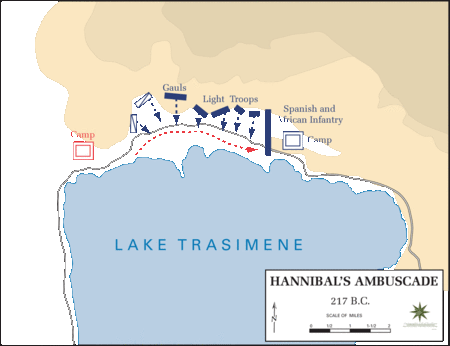It happened today - June 24, 2016
 On this date in 217 B.C., June 24, Hannibal Barca inflicted a crushing defeat on the Romans at the Battle of Lake Trasimene in central Italy. Along with his subsequent annihilation of an entire Roman army at Cannae, eight legions, between 48,000 and 70,000 men, it crushed Rome decisively.
On this date in 217 B.C., June 24, Hannibal Barca inflicted a crushing defeat on the Romans at the Battle of Lake Trasimene in central Italy. Along with his subsequent annihilation of an entire Roman army at Cannae, eight legions, between 48,000 and 70,000 men, it crushed Rome decisively.
Not.
As Victor Davis Hanson notes, the astounding thing about Rome is that the result of such defeats, long before it became a world power, was not collapse but fresh armies arising from the citizens one after another. Hanson has been criticized for his thesis about the superiority of the Western way of war, including because Hannibal did win these battles, forcing Rome to fight a long, defensive, harassing war, avoiding decisive conflicts and wearing Carthage out. But the fact is that they did wear Carthage out. And no amount of rationalizing can conceal the fact that for 2,500 years, wars between Western and non-Western nations have been absurdly lopsided.
Even the wars the West loses, like Vietnam, see enormously higher casualties on the other side.
The Punic War is a partial exception. At Trebia in 218 B.C., though numbers from ancient battles are notoriously unreliable, the Romans seem to have lost between five and seven times as many as the Carthaginians despite having superior numbers. At Trasimene itself, Hannibal had superior numbers coming in, and again his forces suffered perhaps one-sixth the casualties of the severely beaten Romans. At Cannae, the most perfect encirclement battle in history, it was 10 to one. (Curious coincidence: one of the Roman commanders at Cannae, along with the fatally impetuous Gaius Terentius Varro, was Lucius Aemilius Paullus. In the second most perfect encirclement battle in history, at Stalingrad in World War II, the losing commander was von Paulus. It doesn’t mean anything. It’s just weird.)
So here’s the thing. Why didn’t Rome collapse? Why were they able, after such losses on their own doorstep, estimated at one-fifth of all male citizens over 17, with southern Italy revolting and joining Hannibal’s cause, to raise fresh armies, slog on, and win?
Sure, details matter, including the wisdom of putting Fabius Maximum back in charge after Cannae to resume the delaying and harrying tactics that had so frustrated them that they’d let Varro rush into that disaster. And the reorganization of battle tactics to provide greater flexibility after Hannibal had repeatedly outmaneuvered their standard unwieldy formations. But all of this, the capacity to do it and the resilience to make it stick, have deeper roots.
If Trasimene had proved fatal to the Roman cause, along with Trebia and if necessary Cannae, it would be wholly unremarkable. That it did not is therefore necessarily remarkable. Something was different about Rome, something that is still different about the West.